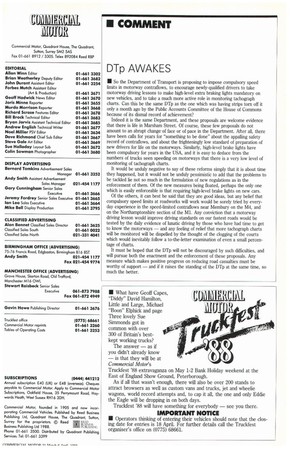DTp AWAKES
Page 5

If you've noticed an error in this article please click here to report it so we can fix it.
MI So the Department of Transport is proposing to impose compulsory speed Limits in motorway contraflows, to encourage newly-qualified drivers to take motorway driving lessons to make high-level extra braking lights mandatory on new vehicles, and to take a much more active role in monitoring tachograph charts. Can this be the same DTp as the one which was having strips torn off it only a month ago by the Public Accounts Committee of the House of Commons because of its dismal record of achievement?
Indeed it is the same Department, and these proposals are welcome evidence that there is life in Marsham Street. Of course, these few proposals do not amount to an abrupt change 'of face or of pace in the Department. After all, there have been calls for years for "something to be done" about the appalling safety record of contraflows, and about the frighteningly low standard of preparation of new drivers for life on the motorways. Similarly, high-level brake lights have been compulsory for years in the USA, and it is easy to deduce from the numbers of trucks seen speeding on motorways that there is a very low level of monitoring of tachograph charts.
It would be unduly negative to say of these reforms simply that it is about time they happened, but it would not be unduly pessimistic to add that the problems to be tackled lie not so much in the formulation of new regulations as in the enforcement of them. Of the new measures being floated, perhaps the only one which is easily enforceable is that requiring high-level brake lights on new cars.
Of the others, it can best be said that they are good ideas, but any belief that compulsory speed limits at roadworks will work would be sorely tried by everyday experience in the speed-limited contraflows near Membury on the M4, and on the Northamptonshire section of the MI. Any conviction that a motorway driving lesson would improve driving standards on our fastest roads would be tested by the daily evidence of lunatic driving by those who have had time to get to know the motorways — and any feeling of relief that more tachograph charts will be monitored will be dispelled by the thought of the clogging of the courts which would inevitably follow a to-the-letter examination of even a small percentage of charts.
It must be hoped that the DTp will not be discouraged by such difficulties, and will pursue both the enactment and the enforcement of these proposals. Any measure which makes positive progress on reducing road casualties must be worthy of support — and if it raises the standing of the DTp at the same time, so much the better.
















































































































































